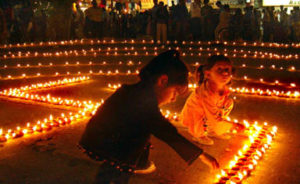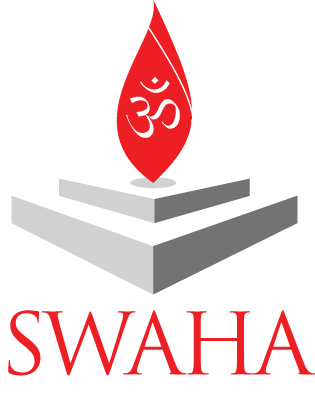 Divali is the festival of lights which simply commemorates light over spiritual darkness, good over evil and knowledge over ignorance. The light of Divali or the light of spirituality, considers the inculcation of dharma(religion), vidya(wisdom) and charitra(good virtues) which we received from our purvaj, our ancestors, bestowed by the great sages. However, the ease of conformity to western modification has greatly influenced today’s society.There is a struggle to rekindle our dharmic values which our forefathers once planted in our fertile land.
Divali is the festival of lights which simply commemorates light over spiritual darkness, good over evil and knowledge over ignorance. The light of Divali or the light of spirituality, considers the inculcation of dharma(religion), vidya(wisdom) and charitra(good virtues) which we received from our purvaj, our ancestors, bestowed by the great sages. However, the ease of conformity to western modification has greatly influenced today’s society.There is a struggle to rekindle our dharmic values which our forefathers once planted in our fertile land.
It is disappointing to say that our sacred religion, our Parampara, is being bombarded by an increasing negligence from the majority of the evolved generation who are unfamiliar with the true essence of this annual observance. This has been prominent from generation to generation within our Hindu community that many individuals have become very religious but not spiritual. It is evident that the light of Divali is diminishing in this modern and cosmopolitan time, such that we are blinded by our own mayaa, our delusions, to the gross extent that Divali has become a cultural “norm” to us rather than a spiritually enlightening journey. Some of society’s attitudes have unfortunately seemed dispassionate towards Sanatan Dharma, our Eternal religion, as agyaan or ignorance propels them instead of gyaan or knowledge. The true substance of Divali has been disregarded as technology allows different media to propagate a façade of what this auspicious festival depicts and finally, such adversities are seen to have become prominent leading to the degradation of Sanatan Dharma.
Sanatan Dharma stands on four pillars, satyam(truth), soucham(cleanliness), dayaa(compassion) and daan(charity). Soucham or cleanliness in this case, of speech and sound, illustrates who, how and what we should speak and listen to in today’s world. Technology succeeds in corrupting the minds of many people via the genre of music, means of communication or television. Music for example, promotes the vast decline of Hindi language through songs and videos that are publicized through various media. Instead of bhajans that transmit positive vibrations, youths and young adults have developed a habit of listening to chutney, soca, dub and other types of so called music that formalize a negative impact on the individual’s behaviour. Individuals would then practise and listen to what appeases their senses, rather than understanding what needs to be done. The various media allow people to focus more on the physical celebration on Divali, such as the great Indian delicacies, beautiful attire of shalwars and sarees and the beautiful deeyas and fireworks, but, what about igniting the light inside each of us?
‘Siya Ram Mai Saba Jaga Jaani’- there is the presence of Shri Ram and Sita in all and thus we should mirror the valorous qualities and character that those forms of God displayed. This is yet another great example of Sanatan Dharma that has been institutionalized, but sadly forgotten. Shri Ram was a great leader, calm and respectable, loving and virtuous, while Sita Maa was devoted, affectionate, kind and compassionate, both loved by many. Ramayan teaches that one should possess such assets, always keeping the Lord in the heart and on the lips and success will always come. But how can someone practise scriptures if that enthusiasm or that thirst for gyaan is absent? Going to our mandir, surrounding ourselves with Holy individuals, attending Yagyas, satsang and Ramayan all develop our bhakti or devotion and our spirituality. It allows us to slowly but surely ignite or rekindle the light on the inside, remove the agyaan or ignorance, so that we can also refract that light to others so they too can manifest their light, thus stimulating the true essence of Divali.
Lastly, Sanatan Dharma is at a constant battle. We as young Hindus should maintain our Dharma and be proud to continue to walk in the footsteps of our ancestors and elders, for theirs are big shoes to fill. ‘Dharmo rakshati rakshitah’,Dharma protects those who protect Dharma. Lack of competencies and moral values prevents an individual to acquire God’s darshan to free their souls from sansaara, cycle of birth and death. We as Hindus should be obliged to have and to cherish this value system and overpower this dominant laziness and dispassion that we developed ourselves. Seek out the necessary impetus from the elders, parents, teachers and Gurus, practise what you learn and create your own light this Divali.
There is still hope to receive the four goals of life, artha(wealth), dharma(duty), kaam(leisure) and moksha(liberation) the ultimate goal to unite with the Divine. In the words of His Holiness Paramacharya of Swaha, “Every action we perform is like a pooja”. It is not too late to make amendments so that we can gain and not lose the light of Divali in this modern world.
Nirupa Manohar
Member of Gyaan Deepak Kirtan Mandali
